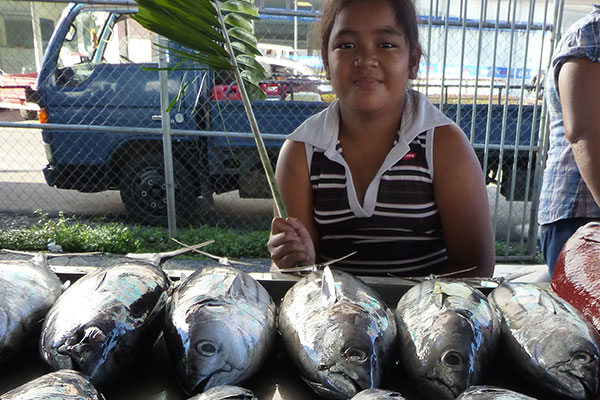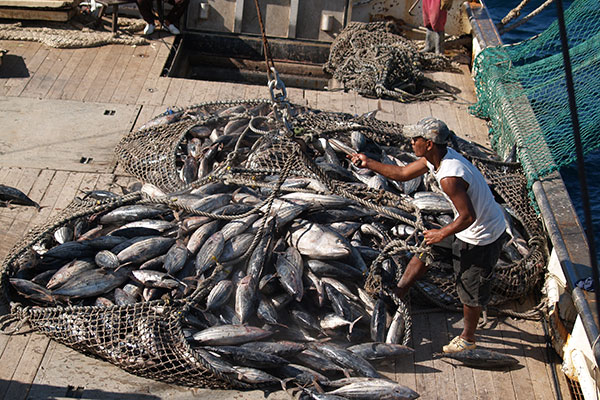February 11, 2015
Tuna allocation to improve Pacific nations’ health and food security
Plentiful and affordable tuna stocks could hold the key to improved health in the Pacific region, a new study has found.

Pacific Island communities have the highest rates of obesity and diabetes in the world, primarily because traditional foods such as root crops, fish and shellfish are being replaced by relatively cheap, energy-dense and nutritionally poor imported foods.
Increased consumption of fish and shellfish - which are rich in protein, essential fatty acids, vitamins and minerals - is seen as an important part of the solution.
The study was led by Australian National Centre for Ocean Resources and Security (ANCORS) visiting Professorial Fellow Dr Johann Bell, while he was employed by the Secretariat of the Pacific Community (SPC), was published recently in the journal Marine Policy.
It found that the amount of fish sustainably harvested from coral reefs would not meet future consumption needs.
However, allocating a portion of the region’s tuna catch for local food security in regional and national tuna management plans would help fill the gap and supply the fish needed for healthy diets.
Hunger pains
Dr Bell and the research team found that by 2020, people in the 22 Pacific Island countries and territories will need 268,000 tonnes of fish per annum for food security, increasing to 344,000 tonnes by 2035. Current total fish consumption is around 210,000 tonnes per annum, and most of this fish is caught from coral reefs.
It is estimated that presently less than one per cent of the average tuna catch from the exclusive economic zones of Pacific Island countries is used for local consumption. Increasing local consumption to about two per cent by 2020 and rising to six per cent by 2035 would greatly improve food security, the study concluded.
"The plea really is for national governments to look at their tuna resources and try to diversify the way in which they are used,” Dr Bell told Radio NZ. “Because yes they are tremendously important for government revenue but they have a very important role to play going forward in local nutrition."

A commercial fishing haul in the Pacific Island nation of Kiribati. Photo: AusAID (CC BY 2.0)
Sustainable catch
Across the region, tuna will need to provide 12 per cent of the fish required for good nutrition in 2020 and 25 per cent in 2035, with fish and shellfish species from coral reef habitats continuing to provide the remainder.
The study team identified three ‘vehicles’ for increasing local access to tuna: expanding the use of fish aggregating devices (FADs) close to shore to assist small-scale fishers to catch tuna; distributing small tuna and bycatch offloaded by industrial fleets at regional ports; and improving the availability of canned tuna for inland populations.
“Investments in nearshore FADs will be maximised by identifying the best sites, monitoring catches to fine-tune the design and deployment of the devices, providing training in FAD fishing techniques, and harmonising the use of FADs within and between coastal communities,” Dr Bell said.
Policy health checks
The industrial fishing exclusion zones around all Pacific Island countries and territories, which are declared to provide coastal communities with access to tuna, also need to be examined to check whether they are working effectively.
The study also concluded that further improvements to stock assessments of the region’s four species of tuna – skipjack, yellowfin, bigeye and albacore – and more observations about how the ecosystems supporting tuna respond to fishing pressure, climatic variability and climate change, would improve knowledge about the distribution and abundance of tuna and help secure the economic and food security benefits available from these valuable fish.
The study involved fisheries and health experts from SPC, Conservation International, the University of Wollongong, WorldFish, the Pacific Islands Forum Fisheries Agency, L’Institut de recherche pour le développement, CSIRO, the University of Washington and Gillett, Preston and Associates.
Media contacts: Jean-Noel Royer, SPC Communication Officer, jeannoelr@spc.int +687 87 70 63 or Johann Bell, University of Wollongong, b.johann9@gmail.com +61 412 657 319.